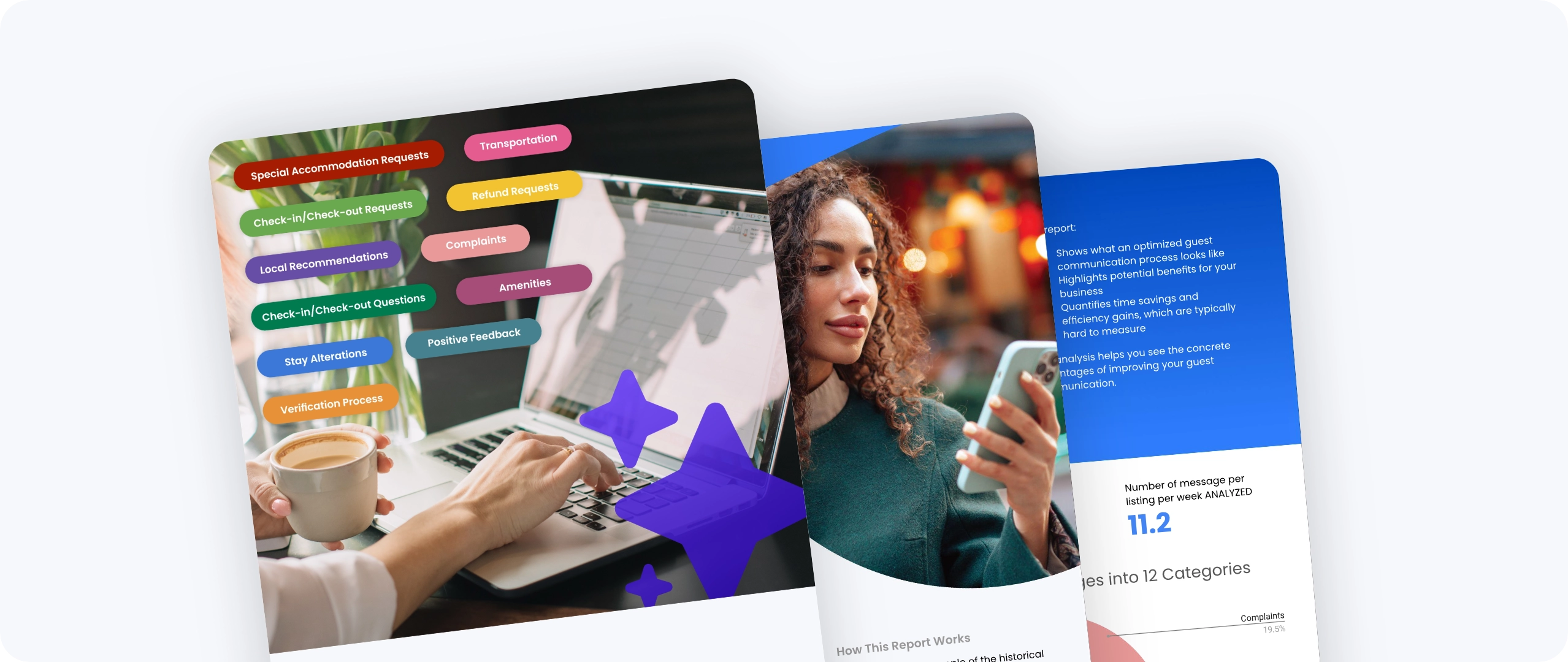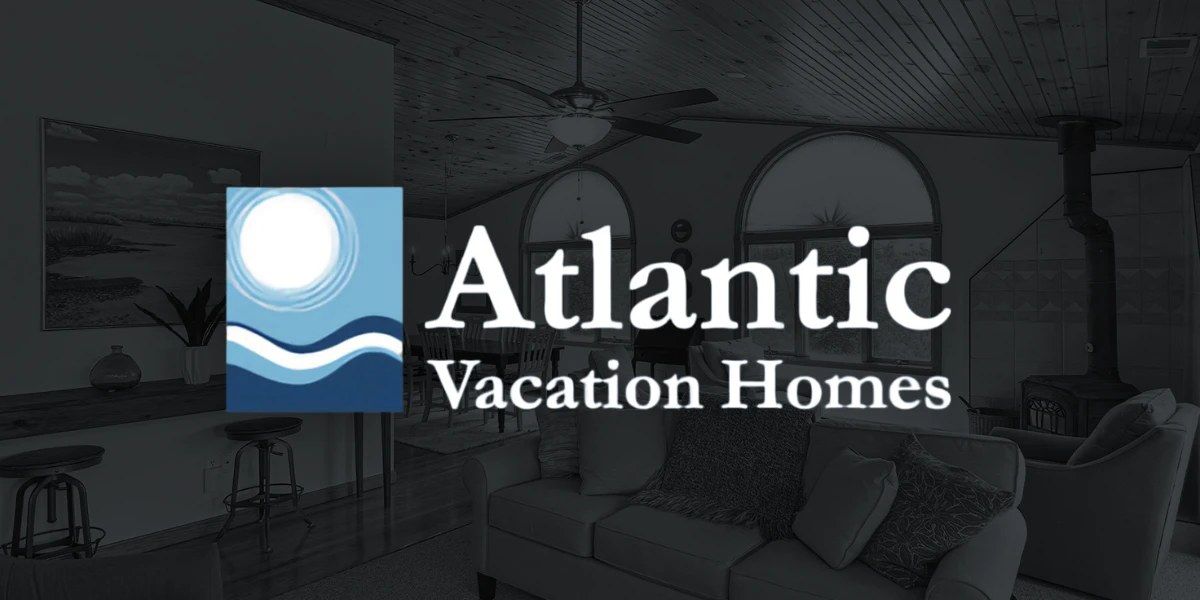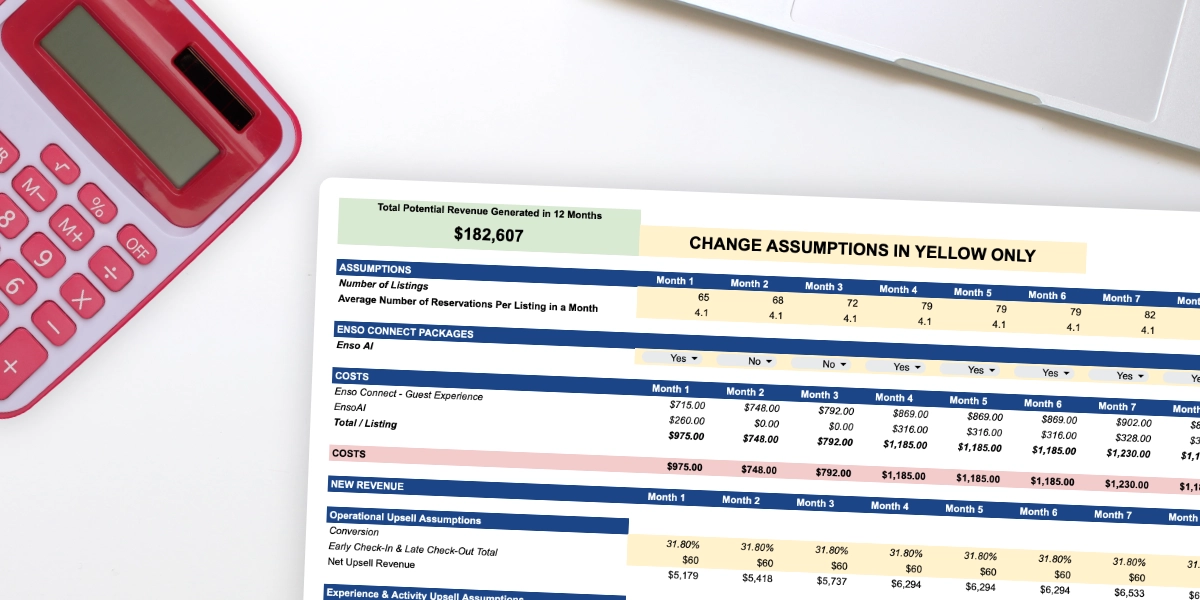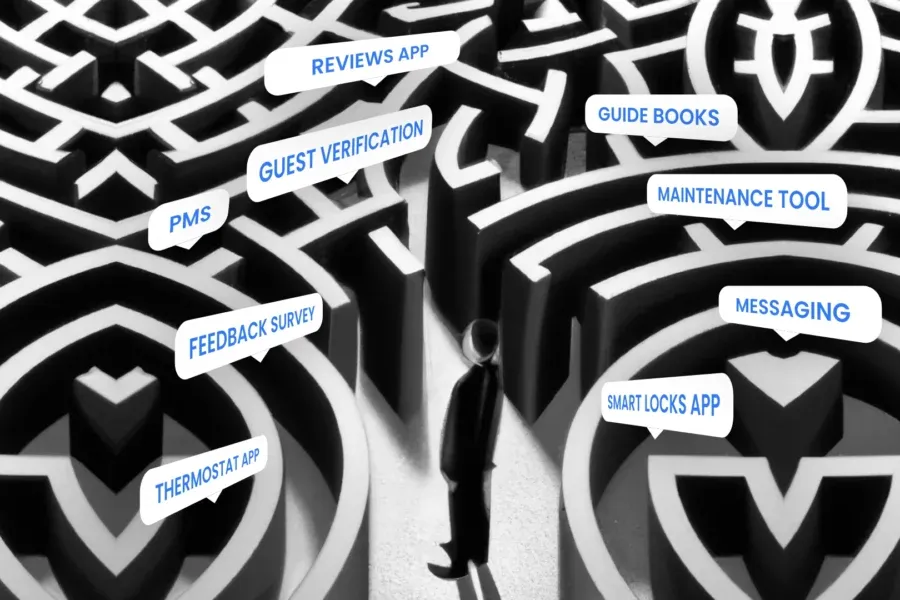During the webinar, we delved into the state of PropTech, exploring recent changes and emerging trends and how they affect hospitality operators. Our speakers discussed how companies deal with the fragmentation and complexity of all the different technologies. They shared tips on how hospitality professionals can leverage technology to deliver a seamless experience for guests, employees and partners, while improving overall efficiency. In addition, the session touched on the long-term outlook for the hospitality tech sector and ways to prepare for the future.
Webinar speakers

Francois Gouelo, Cofounder and CEO of Enso Connect
Enso Connect is a guest experience platform for hospitality professionals. Our goal is to streamline the guest experience by integrating various tools and services, ultimately reducing fragmentation in the industry.
Terry Whyte, Owner, Anna Maria Island Beach Rentals | The Vacation Rental Software Guy
Terry has been in the short-term rental business for nearly three decades, long before the advent of popular platforms like VRBO or Airbnb. He began with a single property and steadily expanded his portfolio to 50 properties over the years.
John An, Founder & CEO at TechTape | Founder & President at Ohana Stay
John founded Ohana Stay, a property management company in Honolulu, and changed property management systems 15 times, searching for solutions. From his own experience and working with other operators, John developed workarounds to create customized tech solutions for short-term rentals. His company, Tech Tape, is a play on words of duct tape. They find ways to make various tools work together for operators, whether integrated or not.
Why fragmentation in hospitality technology deserves attention, now more than ever?
As the hospitality industry continues to attract new tech companies, operators are overwhelmed with options to choose from. On the flip side, with increased mergers and acquisitions in the market, consolidation seems to be the way forward. With this changing technology landscape, it’s important to consider how to select the right tech stack for your business. So, what’s next? How can operators navigate this complex ecosystem to make informed decisions about their technology choices?
The current state of hospitality technology: expert analysis
Terry Whyte:
Do we have fragmentation? Yes. Is it a problem? Yes, but it’s a very good problem to have. I don’t think anybody foreseen in 2020 post Memorial Day weekend, that we as an [STR] industry would be competing directly head on with the hotel industry.
And then COVID accelerated our climb to the top, to compete by at least five years. And the only reason we were able to do that is because we had so much great tech in our industry at that time. Tech is fully responsible for us being accelerated five years ahead and then being able to take advantage of it. So do we have a problem? But we have a very good problem. So we’re in a really good situation.
John An:
I have to agree with Terry. Fragmentation is a challenge, but it also provides opportunities and a diversity of potential solutions for unique hospitality businesses. There’s no such thing as an STR hospitality school. Therefore each of us has constructed our businesses based on our own understanding of how to build one. And so there’s no perfect fit. Various tools provide flexibility to find what suits us and grow our business, unlike Microsoft’s fixed way of working. At TechTape our role is to defragment the industry rather than consolidate it.
Explore the impact of fragmentation in hospitality technology with our latest insights. Discover how fashion suits are revolutionizing the industry, integrating cutting-edge tech to enhance guest experiences. Stay ahead in the competitive hospitality market by understanding the role of seamless technology in delivering exceptional service.
Francois Gouelo:
Hospitality professionals employ channel managers, property management systems, CRMs, guest experience platforms, KYC firms, smart locks, housekeeping and much more. As the list grows, innovation and connecting all pieces are essential for scaling your business through the growing pains.
Making a hospitality tech choice: best-in-breed VS all-in-one
We asked the panelists about their approach to selecting technology. Are they seeking solutions for particular issues they encounter, or do they consolidate various problems in search of a one-stop-shop solution? How do they manage the intricacies involved in using technology to solve their problems?
Terry Whyte:
Several years ago, I chose my PMS with one goal in mind: to accomplish as much as possible without having to leave the platform. On a daily basis, I hardly ever leave my PMS, as I perform all my tasks within it. This includes tasks such as quoting, utilizing my unified inbox, managing my finances, and using a CRM. The only exception is when I need to adjust pricing, as I use Price Labs for that. However, I can confidently state that on a daily basis, I do not leave my PMS for any other reason. This is because I purposely designed my operations this way.
We’re never going to eliminate fragmentation, but we will make sense of it. Tech tools are going to work together in a cohesive way. And the big winners are going to be property management software.
According to Terry Whyte, the three major players in the PMS industry are Track, Streamline (which acquired Lightmaker), and Guesty. With Guesty bridging the gap between European and North American operators. Among others the expert mentioned Jetstream, Jurny, Hostfully and Direct.
Outside of the PMS category, the three biggest technologies are Breezeway, Enso Connect and Dack. And they’re going to lead the sector.
Terry recalled his accurate prediction in 2018 about Expedia discontinuing V12 PMS, which was widely regarded as one of the top PMS on the market. As a result, nearly all of V12’s clients transitioned to a single PMS. The reason is that every property manager with more than 40 listings will migrate to the strongest technology every single time. Terry believes that Enso Connect, Dack, and Breezeway will have a similar impact and usher in a new era of hospitality technology.
John An:
There are multiple universes within the short-term rental industry. There are traditional VRMA members, multi-generational property management companies that previously used V12 and moved on to other solutions. Additionally, there is a vast audience of new players entering the short-term rental market. While the largest PMS providers are dominating the industry, they often do not cater to smaller businesses. As a result, new winners will emerge in the “long tail” because there is also the fragmentation of operators.
Francois Gouelo:
Each business in the vacation rental segment is unique, as are the owners and the guests. As a result, it is unlikely that any single solution will be able to cater to everyone. Vendors that are able to focus on solving the problems of a particular audience will become winners in different verticals.
Terry Whyte:
Big PMS companies don’t want to work with Property Managers managing less than 40 properties. But the problem is that people with 20 or less properties make up about 80% of all the operators. However, their definition of a tech stack is Airbnb, maybe Vrbo and spreadsheets. And for that reason the short-term rental industry is not ready for consolidation yet. Hence the big PMSs are in trouble and that’s where we are going to see a big change.
As they begin to handle connections with online travel agencies internally, they might end up displacing some of their partners. At the same time they are fighting to own other aspects of short-term rental tech, such as guest experience, cleaning, pricing, and loyalty. As a result, companies either develop the necessary tools and systems in-house or acquire them. Many property management systems (PMSs) seem to prefer the former option of building these tools themselves.
Marketplace VS white label approach to solve fragmentation in hospitality technology
We asked the speakers about their opinion about the next wave of hospitality tech. What is the best solution for the fragmentation of the industry: M&As, marketplace integrations or white label approach.
Terry Whyte:
I’m sorry, but I strongly believe that creating a marketplace in our industry is not a viable option. It’s simply not feasible to take the most crucial component of a tech stack, which is the Property Management System (PMS), and turn it into a reservation software that integrates with 30-35 different software programs, each with their own separate logins and dashboards. It’s not a practical solution. For the most part, consolidation is going to kill the innovation and the diversity that we have in the industry.
I believe that white labeling is likely to be the ultimate solution. The reason for this is that even though companies like Gesty or Track have resources, they cannot possibly dedicate enough to dynamic pricing like Wheelhouse or PriceLabs, or provide the same level of resources for guest experience as Enso Connect and Dack, or for maintenance like Breezeway does. It’s just not feasible for them to do it all. Therefore, specialized expertise is needed, and this expertise can be provided by third-party services. And all of this needs to be brought together.
John An:
In comparing marketplace, white label, and acquisitions, I believe that the practice of acquiring companies is having a negative impact on innovation. It is primarily driven by financial gain, as institutions with the most money are able to purchase companies and discontinue their technology. Clients are often forced to adapt to the new system, even if switching to a different one would make more sense.
Francois Gouelo:
In my opinion, utilizing the marketplace approach is a promising path to foster more innovation, but it heavily relies on seamless integration. Unfortunately, many companies and partners in our industry tend to compromise on integration to consolidate data on their platform and establish dominance. At Enso Connect, we ensure consistent two-way data synchronization, regardless of who controls the data. Data is data, and it’s essential to have it available across different platforms, such as in your PMS, guest platform, or cleaning tool, to streamline processes. While the white label approach might address the issue of multiple logins, I believe that the marketplace model is the key to promoting data sharing and addressing fragmentation. The core problem is not necessarily having multiple logins, but rather the lack of communication and integration among different systems.
Predicting solutions for fragmentation in hospitality technology
According to Terry Whyte, plug and play will always remain relevant in the hospitality industry. Most of the industry’s innovation has originated from sources outside the PMS. The focus is now shifting towards enhancing the guest experience, which entails improving guest communication, upsells, verification, remote lock connectivity, and more.
I would not underestimate the no-code movement that’s happening right now. That is what’s really enabling a lot of operators to really custom fit the fragmented technology into a way that works for their business.
Hospitality tech predictions:
- Stronger PMS
- Stronger guest experience platforms
- Professionalization
- Access to data and information in consumable way
- Personalize guest experience with technology
The data fragmentation challenge
Third party services rely on PMS to obtain information regarding various systems in the business such as guest experience, operations, etc. It’s no secret that third-party services often have to rely on booking data silos, which can be a major challenge.
Since they are at the far end of the information chain, it is crucial for the PMS to provide the necessary information to operate smoothly. The management of data flow within a hospitality business can be a challenge, it’s like a chess game involving multiple players. Some property management systems may take fees from both service providers and property managers to access this critical information. Others just lack certain functionalities, webhooks, or other tools that restrict the capabilities of third-party services.
Similar to property managers facing operational fragmentation, tech companies face fragmentation regarding data. The centralization of data in a hospitality business is a challenging mission that requires coordination and synchronization among multiple stakeholders.
How white label approach in tech fosters innovation
Francois Gouelo expressed his view on how the white label format drives innovation. He gave an example of integrating with a major lock company in the industry, enabling both PMS’s guest experience platform and other companies to incorporate numerous smart locks within a few days. The growth that ensued emphasized the significance of prioritizing integration with other partners, implementing two-way synchronization, and adopting a white label format.
This includes utilizing tools like Autohost, Superhog, Partee and others to centralize operations effectively while still utilizing the best-in-class systems.
Guest experience tech – the next hot thing in the industry
Property Management Systems (PMS) play a vital role in the hospitality industry’s technology landscape. When integrated with guest experience tools, it creates a robust platform. The winners will be those who can leverage the full functionality of a unified platform. However, the guest experience tech sector is also highly competitive and rapidly growing. There will be fierce competition, and innovative and sophisticated technology will emerge.
10 core components of hospitality tech stack
According to Terry Whyte, as complicated as technology is in our industry, we can break it down into the 10 core components of a tech stack.
They are: the PMS, the website, booking engine, distribution, operations, revenue management, CRM, guest communications, guest experience, home automation, digital marketing. The best way to simplify it right now is get the best PMS you can afford, get the best website that you can afford, and you have to see the guest experience, the guest communications platforms, you have to align yourself with them. They’re the future of our industry.
John An added that another exciting vertical is “the integrators”. The companies that are integrating, they’re not providing any other service other than integrating the different technologies.
Q&A
Justifying the cost of fragmentation in hospitality technology
Question:
Incorporating various tools comes with a cost, which can quickly add up. Starting with the PMS at $40 per listing per month, adding a guest experience platform for $10, and including more tools, could lead to spending $100 monthly per listing. How do you justify the cost of technology?
Expert answer:
John An
The justification for using these tools is that if a human were doing the work, it would likely cost more and yield poor results. I balance the costs of each tool and consider how much time I would spend using spreadsheets without a PMS. Some PMSs have a $10,000 onboarding fee, making it cost-prohibitive for smaller operators. However, spending $100 a month can replace a human salary and justify the cost.
Terry Whyte
At some point our industry will have to talk about the costs of the hospitality tech stack. Sometimes overlapping systems are increasing the costs without adding value.
Francois Gouelo:
Ultimately, each system must justify its return on investment. The Enso Connect focus has shifted from saving time to making more money, as seen through upsells and increased revenue of the users.
Can AI help solve the fragmentation in hospitality technology?
Question:
Hospitality professionals have concerns about using AI. Will the release of ChatGPT change the hospitality tech landscape, helping solve the fragmentation?
Answer:
Francois Gouelo is convinced that this technology has the potential to be a game-changer in hospitality. For instance, talking about the hefty onboarding fees, why would you need a human to help you with that? A system should be able to onboard itself. This is where ChatGPT and similar systems come into play. They could provide valuable insights into the data within your PMS, helping you get onboarded faster and even acting as a personal assistant to take on manual and tedious tasks, and potentially eliminating frictions along the guest journey. We will be discussing this further in April and May.
Fragmentation in hospitality technology worldwide
The hospitality technology industry is geographically fragmented, with significant differences between European and North American property managers. These differences could be due to language barriers or operational complexities, such as sending IDs to local authorities. In Spain, it goes to the Guarda Nacional, but in Italy, it has to be sent to every single department, whereas in the US, it is not required.
Although this fragmentation can make it challenging to manage a global business, having the right tools to deal with the different geographical issues can also help solve problems. I’m interested to see how the industry progresses towards consolidating not only from a tech perspective but also a geographical perspective.
Many European companies have been in the short-term rental industry for a more extended period than others, and most of them have their proprietary internal tech stack that has worked for them. However, the technology they use is old and not taking advantage of newer advancements. Another trend is that European big players are expanding into the US, and vice versa, US technology big players are entering the European market.
Learn what Enso Connect can do for your business





